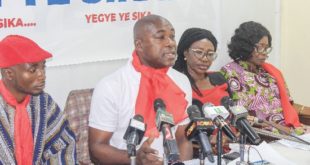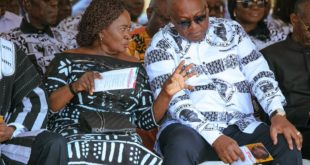Closing Statement By The President Of The Republic Of Ghana, Nana Addo Dankwa Akufo-Addo, At The Dialogue Organised By The Africa Prosperity Network On Saturday, 28th January 2022, At Peduase Lodge, Eastern Region, Ghana.
On behalf of the Government and people of Ghana, I congratulate the Africa Prosperity Network, the Secretariat of the Africa Continental Free Trae Area (AfCFTA), the United Nations Economic Commission for Africa, the United Nations Development Programme, the team at the Office of the President, and all other partners and sponsors for what I can safely describe as the success of this historic Dialogue and that of the associated Business and Policy Leaders Dialogue.
I thank my fellow Presidents a great deal for sending their representatives to grace this meeting with their attendance. It is, yet again, another demonstration of their commitment towards the success of the AfCFTA. My sincere gratitude also goes to the Lead Presenters and Contributors, the Panellists, and Thought Leaders for a great job done. And I want to thank all of you for coming to Ghana for this colloquium.
The last three days have seen the best of African minds and expertise at work, and reiterated our collective desire to transform the African continent. The insightful discourse, filled with great passion, and fuelled by the wealth of cutting-edge knowledge and business experience, has ensured that we have a practical and pragmatic Compact and Action Plan to drive accelerated implementation of the AfCFTA. We need ‘Quick Wins’, and this is exactly what the outcome of this Dialogue offers us, as well as a concentrated focus on the steps towards prosperity for the African peoples.
Excellencies, it is encouraging to note that, as of November 2022, forty-four (44) AU Member States have ratified the Africa Continental Free Trade Agreement. This is strong evidence of the growing political will and commitment of the leadership on the continent to achieve market integration in Africa. It is our duty to continue to engage to ensure the full participation of all Member States.
The effects of the global pandemic and the ongoing geopolitical conflict in Russian and Ukraine on Africa have been significant – from rising food and energy costs, to loss of domestic revenues and unsustainable debt levels. In fact, we are one shock away from a very dire situation. Consequently, Africa must, with a sense of urgency, work together to guarantee her economic security, and secure the prosperity of her peoples.
To accomplish this shared objective, African political and business leaders, as well as other strategic stakeholders, should use actively the opportunities presented by the AfCFTA Agreement to boost intra-African trade in food, industrial products and services, in order to enhance productive capacity, and strengthen its resilience to external shocks. The AfCFTA will eliminate tariffs on ninety-seven percent (97%) of goods traded within the continent, offering significant opportunity for businesses to set up in or expand in Africa.
Ladies and Gentlemen, whilst we recognize the enormous challenges we may face, it is the smart actions that we take, the investments that we make in our peoples, and the speed and effectiveness in implementing the common African market that will guarantee that the 1.3 billion people, who call this continent home, can enjoy prosperous and fulfilling lives.
We are already seeing some important progress. For example, a number of financial institutions have signed onto the Pan African Payment Settlement System, a digital platform to facilitate trade. It is a significant step towards the creation of the single currency, which will be a major facilitator of the effectiveness of the single market. We have achieved some ninety percent (90%) convergence on the rule of origin, with the exception of a few commodities, and the US$9 billion worth of investments have been secured by the AfCFTA Secretariat. But, there is a great deal to be done to realise the full benefits of intra-Africa trade. And I believe there is broad agreement here, at this Dialogue, on four (4) fundamental elements for our progress.
Firstly, the need to invest in our productive capacity and critical infrastructure. We should continue to embark on policies that deepen industrialisation, digital transformation, skills upgrading and infrastructure development by accelerating the implementation of continental programmes, such as the Programme for Infrastructure Development in Africa, the Comprehensive Africa Agriculture Development Programme, the Digital Transformation Strategy for Africa, the Science, Technology and Innovation Strategy for Africa and the Action Plan for the Accelerated Industrial Development of Africa.
Secondly, we have to continue to improve the business and investment climate, and strengthen business and investment promotion organisations with a view to creating an enabling environment for the private sector to contribute to the development of inclusive and sustainable growth in Africa through industrialisation, trade, and the creation of widespread employment opportunities.
Additionally, our governments and their respective private sectors should work to provide opportunities for the development of women and young entrepreneurs, with a view to achieving gender equality, empowering women and girls, as well as engaging youth in the productive sectors of the economy.
To the private sector, especially micro, small and medium enterprises (MSMEs), the time has come to take advantage of the largest single market on the planet to increase value addition, promote economies of scale, and expand your businesses.
Thirdly, we should scale-up efforts to mobilise domestic resources to support our development agenda, including the productive sector. We need to broaden and diversify financial products through innovative financial mechanism such as sovereign wealth funds (SWFs), pension funds, insurance savings, private equity funds, diaspora and sovereign bonds, impact investing, green bonds, remittances, public–private partnerships (PPPs).
And we need to pay serious attention to, and arrest illicit financial flows out of the continent, which are estimated at about some eighty-eight billion United States dollars ($88 billion) annually, depriving Africa of significant resources that could be used to support her development agenda. We must urgently and collectively institute comprehensive and unambiguous tax policies to combat tax-motivated illicit financial flows, strengthen legal and law enforcement systems, and bring together national agencies to stem such flows. We need concrete measures to stop the systemic impoverishment of our continent, and the theft of its resources.
Finally, investment in technology and innovation. Technology and innovation are transforming industries in every sector of the global economy. The ability of African countries to harness and apply technology, i.e. the process of innovation, particularly new and emerging technologies such as nanotechnologies, biotechnologies, artificial intelligence, and robotics, to transform structurally our economies is critical to realising these potential economic benefits.
However, accessibility, affordability and the inadequate regulation and governance frameworks are still impeding the development of emerging technology across the continent. It is, thus, imperative to build technology and trade policy convergences, whilst introducing and adopting new approaches to designing converging technology and trade policy regimes.
In conclusion, I urge all of us here to see ourselves as champions of intra-African trade. We, in Africa, have demonstrated great ambition in setting-up the world’s largest free trade area since the establishment of the World Trade Organization in 1994.
And I believe that the generation of African leaders, led by the distinguished former President of the Republic of Niger, the outstanding AfCFTA Champion, His Excellency Mahammadou Issoufou, who have managed to bring the AfCFTA into being, will occupy as privileged a place in the history of our continent as the generation of pioneer leaders who established the Organisation of African Unity, which has now been transformed into the African Union.
We must now, with great zeal and fortitude, back this great ambition with our collective action to harness fully the benefits of a liberalised, single market for goods and services. This must be our solemn and moral obligation to our continent, to our children and to future generations. We cannot afford to fail. As African nations, we must join hands with each other and work diligently to pursue this noble course. Hopefully, this Dialogue, which has brought so many critical minds together, will not be a one-day wonder, but will become a permanent feature of our collective calendar. With the approval of the AU, I will readily, in all humility, accept my proposed role as AU Champion on the Ratification of the Protocol on Free Movement.
May God bless us all and Mother Africa.
Source: Ghanatodayonline.com/Jubilee House
 Ghanatodayonline.com News, Politics, Health, Education & More
Ghanatodayonline.com News, Politics, Health, Education & More



